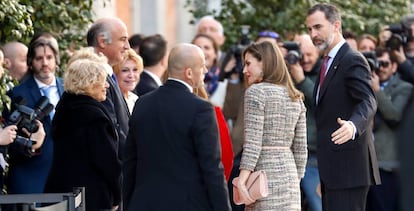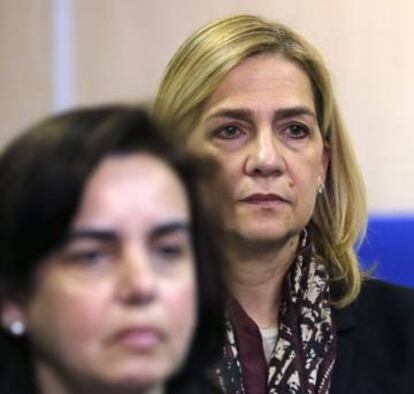Spain’s King Felipe VI silent on sister’s acquittal in major fraud case
The Spanish royal family has distanced itself from Cristina de Borbón and her husband
Spain’s King Felipe VI on Friday learned that his sister had been acquitted of tax fraud charges while he was attending an exhibition of masterpieces from Budapest’s Fine Arts Museum at Madrid’s Thyssen-Bornemisza Museum.

The visit to the temporary exhibition had been arranged before it was known that the ruling in the fraud case – commonly known as the Nóos case – would be handed down, Spain’s royal residence La Zarzuela said.
That ruling also saw Cristina’s husband and Felipe’s brother-in-law, Iñaki Urdangari, sentenced to six years and three months in jail for embezzlement, fraud, influence peddling and tax crimes.
After the ruling was announced, sources at La Zarzuela expressed “absolute respect for the independence of the judiciary,” with King Felipe declining to comment.
Cristina de Borbón is no longer a duchess but remains sixth in line to the Spanish throne
The Nóos case has drawn considerable international attention as it was the first time that a member of the Spanish royal family had been placed in the dock.
The case also represents the biggest crisis to hit the Spanish monarchy since Spain’s return to democracy in 1975, even threatening to destroy all the goodwill garnered when Felipe’s father Juan Carlos interceded to prevent a dramatic coup d’état in 1981.
The monarchy’s image was seriously tainted when the case broke in November 2011 with allegations that Urdangarin and his former business partner Diego Torres were behind a scheme that secured over €6 million in public contracts won for organizing sports and tourism events. The contracts were obtained through no-bid awards that favored a non-profit foundation called Instituto Nóos, run by the partners.
Further damage was done when Torres tried to link La Zarzuela to the activities, and placed Cristina de Borbón at the center of activities of the non-profit foundation, claiming proceeds had ended up bolstering the coffers of Aizoon, a company owned by Cristina and Urdangarin.

Spain’s former king, Juan Carlos I, was unable to find a solution to the crisis by forcing Cristina to divorce Urdangarin or by forcing her to renounce her succession rights to the throne.
The confidence of Spaniards in the monarchy sank even further when it emerged in 2012 that Juan Carlos had been hunting elephants in Botswana, just at the moment when Spain was facing a possible financial rescue from the European Union.
The combination of the scandal over the hunting trip and the Nóos case proved a catalyst for the abdication of Juan Carlos in 2014 with his son Felipe charged with saving the institution.
“Without the Nóos case, it’s highly unlikely Juan Carlos would have abdicated,” sources close to the royal family now admit.
With the proclamation of Felipe VI, Cristina was banished from the royal family and stripped of her title as the Duchess of Palma. However, she remains sixth in line to the Spanish throne.
English version by George Mills.
Tu suscripción se está usando en otro dispositivo
¿Quieres añadir otro usuario a tu suscripción?
Si continúas leyendo en este dispositivo, no se podrá leer en el otro.
FlechaTu suscripción se está usando en otro dispositivo y solo puedes acceder a EL PAÍS desde un dispositivo a la vez.
Si quieres compartir tu cuenta, cambia tu suscripción a la modalidad Premium, así podrás añadir otro usuario. Cada uno accederá con su propia cuenta de email, lo que os permitirá personalizar vuestra experiencia en EL PAÍS.
¿Tienes una suscripción de empresa? Accede aquí para contratar más cuentas.
En el caso de no saber quién está usando tu cuenta, te recomendamos cambiar tu contraseña aquí.
Si decides continuar compartiendo tu cuenta, este mensaje se mostrará en tu dispositivo y en el de la otra persona que está usando tu cuenta de forma indefinida, afectando a tu experiencia de lectura. Puedes consultar aquí los términos y condiciones de la suscripción digital.









































